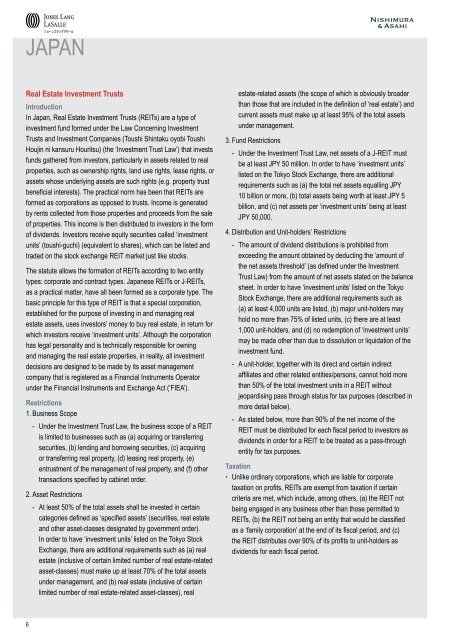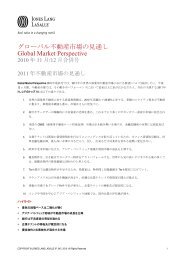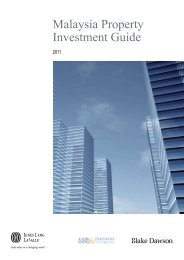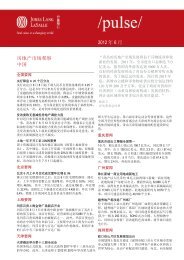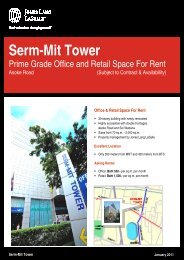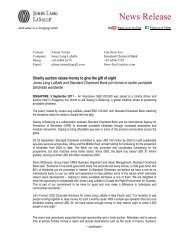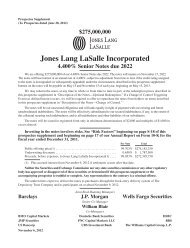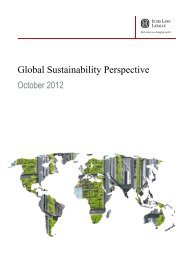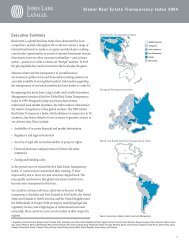Japan Property Investment Guide - Jones Lang LaSalle
Japan Property Investment Guide - Jones Lang LaSalle
Japan Property Investment Guide - Jones Lang LaSalle
You also want an ePaper? Increase the reach of your titles
YUMPU automatically turns print PDFs into web optimized ePapers that Google loves.
JAPAN<br />
Real Estate <strong>Investment</strong> Trusts<br />
Introduction<br />
In <strong>Japan</strong>, Real Estate <strong>Investment</strong> Trusts (REITs) are a type of<br />
investment fund formed under the Law Concerning <strong>Investment</strong><br />
Trusts and <strong>Investment</strong> Companies (Toushi Shintaku oyobi Toushi<br />
Houjin ni kansuru Houritsu) (the ‘<strong>Investment</strong> Trust Law’) that invests<br />
funds gathered from investors, particularly in assets related to real<br />
properties, such as ownership rights, land use rights, lease rights, or<br />
assets whose underlying assets are such rights (e.g. property trust<br />
beneficial interests). The practical norm has been that REITs are<br />
formed as corporations as opposed to trusts. Income is generated<br />
by rents collected from those properties and proceeds from the sale<br />
of properties. This income is then distributed to investors in the form<br />
of dividends. Investors receive equity securities called ‘investment<br />
units’ (toushi-guchi) (equivalent to shares), which can be listed and<br />
traded on the stock exchange REIT market just like stocks.<br />
The statute allows the formation of REITs according to two entity<br />
types: corporate and contract types. <strong>Japan</strong>ese REITs or J-REITs,<br />
as a practical matter, have all been formed as a corporate type. The<br />
basic principle for this type of REIT is that a special corporation,<br />
established for the purpose of investing in and managing real<br />
estate assets, uses investors’ money to buy real estate, in return for<br />
which investors receive ‘investment units’. Although the corporation<br />
has legal personality and is technically responsible for owning<br />
and managing the real estate properties, in reality, all investment<br />
decisions are designed to be made by its asset management<br />
company that is registered as a Financial Instruments Operator<br />
under the Financial Instruments and Exchange Act (‘FIEA’).<br />
Restrictions<br />
1. Business Scope<br />
6<br />
-<br />
Under the <strong>Investment</strong> Trust Law, the business scope of a REIT<br />
is limited to businesses such as (a) acquiring or transferring<br />
securities, (b) lending and borrowing securities, (c) acquiring<br />
or transferring real property, (d) leasing real property, (e)<br />
entrustment of the management of real property, and (f) other<br />
transactions specified by cabinet order.<br />
2. Asset Restrictions<br />
-<br />
At least 50% of the total assets shall be invested in certain<br />
categories defined as ‘specified assets’ (securities, real estate<br />
and other asset-classes designated by government order).<br />
In order to have ‘investment units’ listed on the Tokyo Stock<br />
Exchange, there are additional requirements such as (a) real<br />
estate (inclusive of certain limited number of real estate-related<br />
asset-classes) must make up at least 70% of the total assets<br />
under management, and (b) real estate (inclusive of certain<br />
limited number of real estate-related asset-classes), real<br />
estate-related assets (the scope of which is obviously broader<br />
than those that are included in the definition of ‘real estate’) and<br />
current assets must make up at least 95% of the total assets<br />
under management.<br />
. Fund Restrictions<br />
-<br />
Under the <strong>Investment</strong> Trust Law, net assets of a J-REIT must<br />
be at least JPY 50 million. In order to have ‘investment units’<br />
listed on the Tokyo Stock Exchange, there are additional<br />
requirements such as (a) the total net assets equalling JPY<br />
10 billion or more, (b) total assets being worth at least JPY 5<br />
billion, and (c) net assets per ‘investment units’ being at least<br />
JPY 50,000.<br />
4. Distribution and Unit-holders’ Restrictions<br />
-<br />
-<br />
-<br />
The amount of dividend distributions is prohibited from<br />
exceeding the amount obtained by deducting the ‘amount of<br />
the net assets threshold’ (as defined under the <strong>Investment</strong><br />
Trust Law) from the amount of net assets stated on the balance<br />
sheet. In order to have ‘investment units’ listed on the Tokyo<br />
Stock Exchange, there are additional requirements such as<br />
(a) at least 4,000 units are listed, (b) major unit-holders may<br />
hold no more than 75% of listed units, (c) there are at least<br />
1,000 unit-holders, and (d) no redemption of ‘investment units’<br />
may be made other than due to dissolution or liquidation of the<br />
investment fund.<br />
A unit-holder, together with its direct and certain indirect<br />
affiliates and other related entities/persons, cannot hold more<br />
than 50% of the total investment units in a REIT without<br />
jeopardising pass through status for tax purposes (described in<br />
more detail below).<br />
As stated below, more than 90% of the net income of the<br />
REIT must be distributed for each fiscal period to investors as<br />
dividends in order for a REIT to be treated as a pass-through<br />
entity for tax purposes.<br />
Taxation<br />
•<br />
Unlike ordinary corporations, which are liable for corporate<br />
taxation on profits, REITs are exempt from taxation if certain<br />
criteria are met, which include, among others, (a) the REIT not<br />
being engaged in any business other than those permitted to<br />
REITs, (b) the REIT not being an entity that would be classified<br />
as a ‘family corporation’ at the end of its fiscal period, and (c)<br />
the REIT distributes over 90% of its profits to unit-holders as<br />
dividends for each fiscal period.


